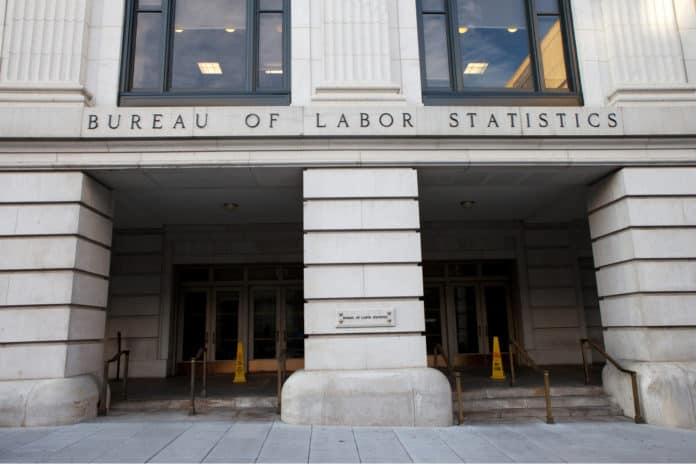Reports are constantly being released highlighting the rapid growth of the cannabis labor market. Barclay’s estimates that the U.S. cannabis industry will be worth $41 billion by 2028. Some estimates skew even higher but many analysts are only seeing the tip of the iceberg. Often, ancillary businesses working with the industry such as construction, security, or tech firms are not considered in these evaluations.
With such a swelling market, there must be huge gains in the number of cannabis jobs created, right? While that is a safe bet, confirming this is actually harder than you may think. The U.S. Bureau of Labor Statistics does not specifically track cannabis jobs. New positions created by the green rush are lumped into general categories such as agriculture, retail, or manufacturing.
Cannabis simply is not receiving the credit it deserves as a job creator, according to Bruce Barcott, Leafly’s deputy editor.
“Legal cannabis [recreational and medical] is America’s greatest jobs creator right now,” Barcott, told news organization UPI. “The problem is it’s untracked by the federal government, and state governments all have their own systems” when it comes to cannabis job statistics.
Leafly and economist Beau Whitney released their own report that tracked cannabis jobs created in each state. As of March 2019, they determined there are now more than 211,000 cannabis jobs across the United States with over 64,000 being added in 2018 alone. This could be partially due to large markets such as recreational sales in California and Nevada getting off the ground.
Healthcare and green industry jobs are expected to grow significantly in the next decade, but growth of the cannabis job market is predicted to dwarf these industries with increases expected to reach 110 percent in the next three years. Who knows where those numbers will be in ten years as more states legalize and create new markets?
Karson Humiston is founder and chief executive officer of Vangst, a job recruitment firm for the cannabis industry. Humiston keeps a close eye on everything related to the cannabis job market and her company has connected over 10,000 applicants to cannabis jobs across the United States. She was featured on Forbes “30 Under 30” list in 2018.
Besides the labor stats not being thoroughly tracked on a federal level, Humiston believes that some workers try to suppress the fact that they are working in the cannabis industry.
“The federal government did a very effective job propagandizing against cannabis so there are a lot of people currently working in the industry that don’t make it public knowledge because of that stigma,” Humiston told mg. “Cannabis is also growing at such a rapid rate that any data that could be collected would be obsolete in a matter of months.”
Despite the stigma and under reporting, states are experiencing a surge in cannabis job growth. According to Leafly and Whitney’s report:
- Washington state had 33,591 cannabis-related jobs in January 2019, growing 36 percent from 26,556 in 2018.
- Colorado’s marijuana jobs grew by 17 percent to a 2019 level of 31,486, up by 4,595 from 2018.
- Florida’s medical cannabis jobs jumped 703 percent from 1,290 in January 2018 to 10,358 a year later.
- Nevada’s medical and recreational cannabis jobs more than doubled during 2018 with the state adding 7,573 new jobs to total 11,766 jobs in January 2019.
- Arizona added 5,120 new medical cannabis jobs in 2018, totaling 11,370 jobs by January 2019.
This rapid growth in the cannabis labor market is creating a new concern for employers—finding qualified candidates to fill job vacancies. Legal cannabis is relatively new, especially when it comes to recreational markets, making it a bit tricky to find employees with the right skills.
“There are not enough workers available for most job sectors in the U.S.—especially cannabis.” Humiston said. “Cannabis skill-sets overlap with pharma, ag, engineering, and many other industries so cannabis companies are competing for those candidates in addition to the highly sought after pool of existing cannabis employees. That pool is growing but not matching the rate of market expansion.”

Aspiring cannabis workers may have some options available to acquire necessary skills. There are now colleges offering cannabis-specific courses and certifications. Oakstersdam, a cannabis school in Oakland, was founded in 2007 and has graduated about 40,000 students worldwide. The school offers courses that cover cannabis horticulture and cultivation, as well as business, compliance, and courses teaching students about effective advocacy.
There also are traditional universities offering accredited cannabis courses. Northern Michigan University’s curriculum now includes a major in Medicinal Plant Chemistry that covers cannabis. According to the NMU website, students enrolled in the program will learn about medicinal plant production, analysis, and distribution.
Stockton University in New Jersey has added a minor in Cannabis Studies. Students will learn about cannabis “cultivation, energy efficiency, small business operations, communications, social media, retail, and patient research,” according to the school’s website.
But are these programs a fast track into the cannabis industry? According to Humiston, it depends.
“There are courses and certifications available that teach cannabis-specific skills but we do not see employers requesting those,” Humiston said. “They’re valuable for someone with zero exposure to cannabis and can give hands-on experience with actual plants or in a lab, but all of the information taught can be found online for free. Aspiring cannabis workers would be wise to learn as much as they can about the specific laws in the states where they are trying to gain employment and to research the actual companies they’re trying to get hired by.”
Although it may not sound easy, Humiston believes aspiring cannabis workers just need to make the best of their initial opportunity to join the industry. “At the end of the day the first cannabis job is the hardest one to get but once you have your foot in the door there is immense opportunity to grow your career and work all over the globe,” Humiston said.
As mentioned earlier, ancillary jobs also are a significant part of the cannabis job market equation. Complex technology is used in many different aspects of the industry including compliance software, lab testing, extraction, dispensary operations, and security.
“Technology is a great example of this as the industry uses point-of-sale software, seed-to-sale tracking software, management software, and inventory software, as well as web-based applications for social portals and e-commerce,” Humiston said. “These all require developers, testers, project managers, salespeople, tech support, and other positions that might not be traditionally associated with cannabis. Security companies provide both physical and electronic security services for shops, labs, grows, and other types of cannabis businesses—including all their cash.”
Even if federal agencies are not thoroughly documenting the growth of the industry, those working in cannabis, or those looking to do so, are clearly walking a career path with a wealth of opportunity.








